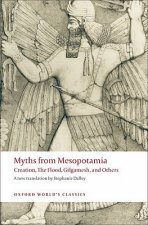
Kód: 04680820
Shostakovich in Dialogue
Autor Judith Kuhn
A thorough examination of Shostakovich's string quartets is long overdue. Although they can justifiably lay claim to being the most significant and frequently performed twentieth-century oeuvre for that ensemble, there has been no ... celý popis
- Jazyk:
 Angličtina
Angličtina - Vazba: Pevná
- Počet stran: 314
Nakladatelství: Taylor & Francis Ltd, 2010
- Více informací o knize

Mohlo by se vám také líbit
-

Lottie Brooks 6
220 Kč -

Myths from Mesopotamia
232 Kč -

The Naturals Paperback Boxed Set
1275 Kč -

Read with Oxford: Stage 1: Julia Donaldson's Songbirds: My Phonics Activity Book
114 Kč -

Crafting with the Pocketknife
286 Kč -

Carpenters: An Illustrated Discography
822 Kč -

Agatha Christie Playing Cards /anglais
378 Kč -

Lottie Brooks 6
318 Kč -

Cattleya
454 Kč -

Bodyguard, 1 Blu-ray
245 Kč -

Seninle Baslamadi
433 Kč -

Reusable Firmware Development
1978 Kč -

Smothermoss
269 Kč -

Little Fur Family
180 Kč
Darujte tuto knihu ještě dnes
- Objednejte knihu a zvolte Zaslat jako dárek.
- Obratem obdržíte darovací poukaz na knihu, který můžete ihned předat obdarovanému.
- Knihu zašleme na adresu obdarovaného, o nic se nestaráte.
Více informací o knize Shostakovich in Dialogue
Nákupem získáte 558 bodů
 Anotace knihy
Anotace knihy
A thorough examination of Shostakovich's string quartets is long overdue. Although they can justifiably lay claim to being the most significant and frequently performed twentieth-century oeuvre for that ensemble, there has been no systematic English-language study of the entire cycle. Judith Kuhn's book begins such a study, undertaken with the belief that, despite a growing awareness of the universality of Shostakovich's music, much remains to be learned from the historical context and an examination of the music's language. Much of the controversy about Shostakovich's music has been related to questions of meaning. The conflicting interpretations put forth by scholars during the musicological 'Shostakovich wars' have shown the impossibility of fixing a single meaning in the composer's music. Commentators have often heard the quartets as political in nature, although there have been contradictory views as to whether Shostakovich was a loyal communist or a dissident. The works are also often described as vivid narratives, perhaps a confessional autobiography or a chronicle of the composer's times. The cycle has also been heard to examine major philosophical issues posed by the composer's life and times, including war, death, love, the conflict of forces of good and evil, the nature of subjectivity, the power of creativity and the place of the individual - and particularly the artist - in society. Soviet commentaries on the quartets typically describe the works through the lens of Socialist-Realist mythological master narratives. Recent Western commentaries see Shostakovich's quartets as expressions of broader twentieth-century subjectivity, filled with ruptures and uncertainty. What musical features enable these diverse interpretations? Kuhn examines each quartet in turn, looking first at its historical and biographical context, with special attention to the cultural questions being discussed at the time of its writing. She then surveys the work's reception history, and follows with a critical discussion of the quartet's architectural and harmonic features. Using the new tools of Sonata Theory, Kuhn provides a fresh analytical approach to Shostakovich's music, giving valuable and detailed insights into the quartets, showing how the composer's mastery of form has enabled these works to be heard as active participants in the Soviet and Western cultural discourses of their time, while remaining compelling and relevant to twenty-first-century listeners.
 Parametry knihy
Parametry knihy
Zařazení knihy Knihy v angličtině The arts Music Music: styles & genres
5584 Kč
- Plný název: Shostakovich in Dialogue
- Podnázev: Form, Imagery and Ideas in Quartets 1-7
- Autor: Judith Kuhn
- Jazyk:
 Angličtina
Angličtina - Vazba: Pevná
- Počet stran: 314
- EAN: 9780754664062
- ISBN: 0754664066
- ID: 04680820
- Nakladatelství: Taylor & Francis Ltd
- Hmotnost: 742 g
- Rozměry: 240 × 164 × 26 mm
- Datum vydání: 28. February 2010
Oblíbené z jiného soudku
-

Just Kids
279 Kč -

Elvis and Me
213 Kč -

The Dirt - Mötley Crüe
337 Kč -

Lords Of Chaos - 2nd Edition
532 Kč -

Moonwalk
288 Kč -

Iron Man
333 Kč -

Dancing The Dream
640 Kč -

It's So Easy (and other lies)
298 Kč -

Aphex Twin's Selected Ambient Works Volume II
305 Kč -

Dirt
534 Kč -

Metalion: The Slayer Mag Diaries
1021 Kč -

Real Frank Zappa Book
445 Kč -

You Are Not Alone
333 Kč -

Everybody Loves Our Town
333 Kč -

Jaco
508 Kč -

Last Train To Memphis
366 Kč -

Madonna Confessions
804 Kč -

Hacienda
258 Kč -

Ed Sheeran: Writing Out Loud
781 Kč -

Bruce Springsteen
439 Kč -

Rammstein on Fire
925 Kč -

Kicking & Dreaming
428 Kč -

The Long Hard Road Out Of Hell
359 Kč -

Scar Tissue
283 Kč -

M Train
337 Kč -

88 Piano Classics For Beginners
436 Kč -

Complete Preludes, Nocturnes & Waltzes
508 Kč -

I'm with the Band
344 Kč -

I Am Ozzy
347 Kč -

Jazz Theory Book
1340 Kč -

Real Book
1127 Kč -

Beastie Boys Book
894 Kč -

Paganini: Twenty-Four Caprices for the Violin, Op. 1
256 Kč -

Standing in the Shadows of Motown
953 Kč -

Lifting Shadows The Authorized Biography of Dream Theater
546 Kč -

Gustav Mahler
921 Kč -

Loving Amy
337 Kč -

Messiah (Watkins Shaw)
336 Kč -

Kurt Cobain
632 Kč -

Look at Me!
449 Kč -

Learning to Fly
379 Kč -

Harmony, Counterpoint, Partimento
1786 Kč -

Library of Piano Classics
678 Kč -

Michael Stipe
283 Kč -

Cocktail Piano
550 Kč -

Field Guide to Post-Punk & New Wave
326 Kč -

Field Guide to Punk
441 Kč -

Tori Amos On Track
436 Kč -

A Perfect Union of Contrary Things
410 Kč
Osobní odběr Praha, Brno a 12903 dalších
Copyright ©2008-24 nejlevnejsi-knihy.cz Všechna práva vyhrazenaSoukromíCookies



 Vrácení do měsíce
Vrácení do měsíce 571 999 099 (8-15.30h)
571 999 099 (8-15.30h)